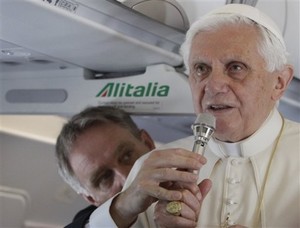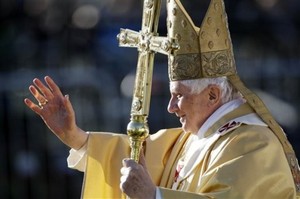On the plane to Scotland this morning the Pope held the typical Q&A session with reporters. THE more important of the Q&A, in my opinion, is noted below. The questions are vetted prior to the asking.

Question:
The UK, like many other Western countries - there is an issue that you have already touched on in the first answer -it is considered a secular country. There is a strong atheist movement, even for cultural reasons. However, there are also signs that religious faith, particularly in Jesus Christ, is still alive on a personal level. What can this mean for Catholics and Anglicans? Can anything be done to make the Church as an institution, more credible and attractive to everyone?
Answer:
I would say that a Church that seeks to be particularly
attractive is already on the wrong path, because the Church does not work for
her own ends, she does not work to increase numbers and thus power. The Church
is at the service of another: she serves, not for herself, not to be a strong
body, rather she serves to make the proclamation of Jesus Christ accessible,
the great truths and great forces of love, reconciling love that appeared in
this figure and that always comes from the presence of Jesus Christ. In this
regard, the Church does not seek to be attractive in and of herself, but must
be transparent for Jesus Christ and to the extent that she is not out for
herself, as a strong and powerful body in the world, that wants power, but is
simply the voice of another, she becomes truly transparent for the great figure
of Christ and the great truth that he has brought to humanity. The power of
love, in this moment one listens, one accepts. The Church should not consider
herself, but help to consider the other and she herself must see and speak of
the other. In this sense, I think, both Anglicans and Catholics have the same
simple task, the same direction to take. If both Anglicans and Catholics see
that the other is not out for themselves but are tools of Christ, children of
the Bridegroom, as Saint John says, if both carry out the priorities of Christ
and not their own, they will come together, because at that time the priority
of Christ unites them and they are no longer competitors seeking the greatest
numbers, but are united in our commitment to the truth of Christ who comes into
this world and so they find each other in a genuine and fruitful ecumenism.


